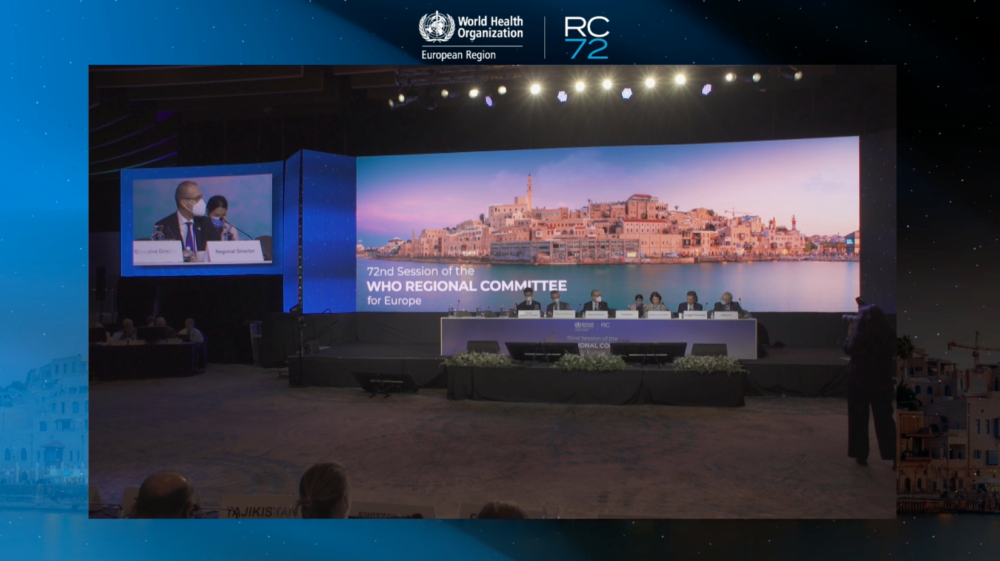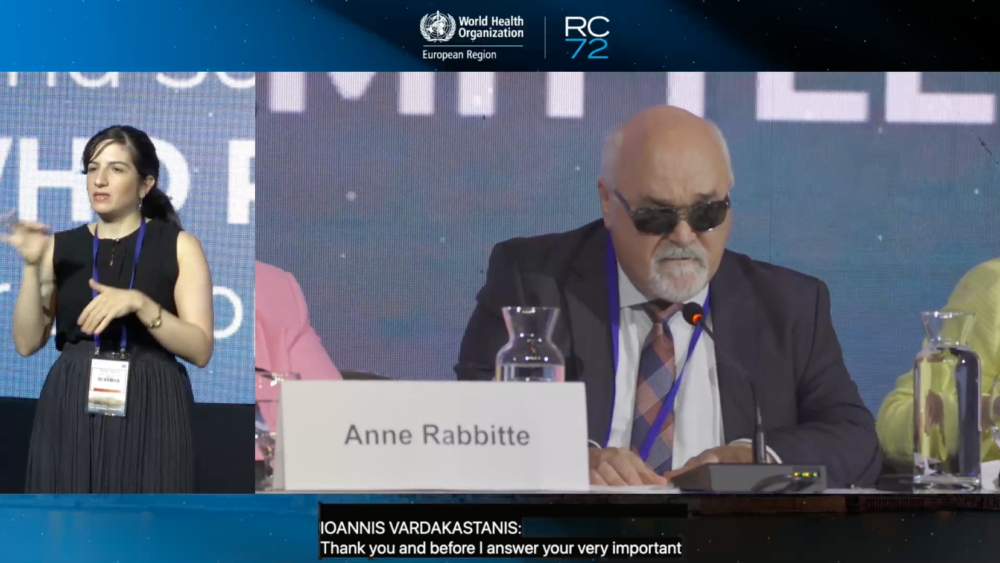We welcome the adoption of the WHO European framework for action to achieve the highest attainable standard of health for persons with disabilities 2022–2030. This new framework has four objectives: universal health coverage; the promotion of the health and well-being of persons with disabilities; the protection of persons with disabilities during public health emergencies and the creation of an evidence base on disability and health.
The framework was discussed and approved on the 13th of September. The World Health Organisation’s (WHO) Regional Committee for Europe hosted a panel session on “achieving the highest attainable standard of health for persons with disabilities”.

The panel included the participation of the Regional Director of WHO Europe Hans Kluge; Yannis Vardakastanis, President of the European Disability Forum; Natasha Azzopardi Muscat, WHO Director for Country Health Policies & Systems; and Anne Rabbitte, Minister of State for Disability in Ireland.
The session started with a video from MP Shirly Pinto, a member of the Israeli Parliament and a deaf advocate. She shared issues with accessing healthcare, especially regarding the accessibility and communication through interpreters. MP Pinto also shared the need for more accessible clinics around the country.
The WHO’s Regional Director for Europe, Hans Kluge, opened the session by stating that health systems must be disability inclusive. He stated that nobody should face discrimination in accessing health care. Mr Kluge underlined that the resolution supports the work of the World Health Organisation and that “it is about not leaving anyone behind.” The framework includes a strong commitment to work with organisations of persons with Disabilities.
Natasha Azzopardi Muscat, Director for Country Health Policies & Systems at WHO Europe followed the Regional Director, saying that there are still many issues and barriers blocking full access to healthcare for persons with disabilities. Ms Azzopardi Muscat shared the three objectives in relation to disability-inclusive healthhas; (1) ensure equitable access to services; (2) promote health and well-being and (3) disability-inclusive policies and develop evidence-based approaches.
Yannis Vardakastanis, EDF President started the panel session by thanking the delegates present for the collaboration between WHO and organisations of persons with disabilities during the pandemic, and on-going since then. During his intervention EDF President said:
Persons with disabilities face several barriers to accessing and using health care services. These barriers are related to disablism, which refers to environments, policies, procedures, behaviours, and attitudes that disadvantage persons with disabilities.

On the question of how discrimination impacts access to health, Mr Vardakastanis explained the several barriers that persons with disabilities face. They include denial of reasonable accommodation; discriminatory attitudes; structural issues; and negative stereotypes.
Disability discrimination is a major impediment to achieving equal rights for persons with disabilities – this includes the right to health – we face many barriers to using healthcare services – environments, policies procedures, behaviours and attitudes
Mr Vardakastanis concluded with a statement on the participation of the representative organisations of persons with disabilities (OPD) in health systems. OPD’s participation in decision-making is essential to make these systems more inclusive and democratic. He stressed the importance of the input provided by OPDs in all areas of the new framework, especially in:
- The development and implementation of action plans to ensure that they address the needs identified by persons with disabilities in a meaningful way;
- The representation of persons with disabilities across all sectors of society, including in the health workforce;
- The research development to have evidence that supports the rights of persons with disabilities and that promotes equitable access to health care;
- The monitoring and evaluation of the framework
Anne Rabbitte, Minister for Disabilities in Ireland added the importance of collaborative work. She explained that a fundamental action in Ireland was reorganising services for children with disabilities by developing community-based services. In addition, she added that the real challenge was the shift of perspective to a rights-based approach, primarily through close consultation with children with disabilities, staff and academics. She underlined that digital and assistive technologies are crucial tools to enable independent living.
Ms Rabbitte closed the panel by sharing that “persons with disabilities must be at center of decision-making”, and she agreed with Mr Vardakastanis that participation and funding of organisations of persons with disabilities are essential. She stated that cross-departmental work is very important and finalised by saying that European ministers must work together to improve healthcare across Europe.